
 Chocolate's Hidden Ingredient: Child Slavery
Gary Vey for viewzone.com
The next time you bite into a chocolate bar or enjoy a hot cup of cocoa you might want to consider a secret horrible ingredient -- child slavery. All food has some dark side we'd rather not think about. Eating meat involves killing animals, and that's not pleasant. Eating tuna kills dolphins that get caught in the fishing nets. But eating chocolate causes real human misery that can be easily stopped.
It's been 200 years since the abolition of slavery in most countries. But in the Ivory Coast, the slave trade is booming like never before. The UN estimates that 15,000 Malian adolescents are kept as slaves there. Cocoa makes up a third of the national income in the Ivory Coast. Their are about a million cocoa farms in the nation and these produce about half the world's supply of cocoa. Cash cropping for big foreign corporations has replaced the diverse and locally sustaining farming of the past. This means that the population is dependent on earning money from international markets to be able to buy food they used to grow themselves. This is the evil side of the "global market" that we seldom hear about. Where barter and locally produced sustenance once made life simple and stable, the new need for paper money has turned many "global market" nations to poverty riddled slums, rich only in corruption and exploitation.
It's easy to lure children from poverty-stricken families where parents sometimes sell their children to "recruiters" for as little as $1.50, assuming their kids will get a chance at a better life. Traffickers play on these hopes and dreams, spending up to two months in certain areas recruiting and even convincing parents to pay the passage fee from the village to the farms. "You can make a lot of money in the Ivory Coast that will let you buy a bicycle, clothes, or food for your family," is a bold but effective line that traffickers reportedly use to recruit young workers and legitimize their search. Unfortunately, the promises of being able to support your family or afford small luxuries are too good to be true. But once they have been delivered to the cocoa plantations, it's too late. The dream of new opportunities and of helping their impoverished families soon evaporates along with their hope. Children often are made to work 12 hour days of hard labor in the hot sun. Their living conditions are crowded and often unsanitary. Often the receive no wages at all. Drissa's story
Drissa's captors controlled him and other slaves not only with brutality, but also with a psychological terror -- they were told a tale that they were under a magic spell, and if they tried to run away they would be paralysed. Some still dared to run away. Once recaptured (as they almost always were) the runaways were beaten. Stripped of their clothes, their hands tied behind their backs, they were viciously whipped over several days with the farmer repeatedly demanding an answer to the impossible question, "How did you break my spell?" The others watched in fear. Some boys did not survive, those that did were put back to work as soon as they could walk. Their wounds, like the ones found on Drissa, became infected and they had to rely on the maggots feeding on their flesh to clean the wounds and save them from gangrene. The brutality, isolation, hunger and exhaustion, all combined to break the spirit and will of Drissa and his fellow captives, locking them into years of slavery. Interpol intervenes It was a drop in the bucket, for sure, but perhaps it will be the "shot across the bow" to plantation owners and child trafficers. In the last month, fifty-four children of seven different nationalities were rescued from plantations, and eight people were arrested in connection with the illegal recruitment of children during a two-day operation in Ivory Coast, codenamed "BIA". Interpol says the plantation owners had bought the children, between ages 11 and 16, due to the need for cheap labor for harvesting. "They were discovered working under extreme conditions, forced to carry massive loads, seriously jeopardizing their health." 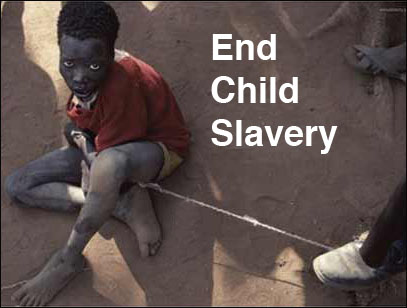 These children were completely unaware of their rights or the fact that what was happening to them was illegal, Interpol reported. "They would regularly work 12 hours a day and receive no salary or education. Girls were usually purchased as housemaids and would work a seven-day week all year round, often in addition to their duties in the plantation." "Perhaps the most dangerous task from the standpoint of health and safety," reported the International Institute for Tropical Agriculture (IITA), "is the application of noxious pesticides." Children are reportedly forced to work with dangerous chemicals and not provided with safety equipment. They are also forced to use machetes. "An estimated 146,000 children under the age of 15 were clearing plantations using machetes..." the IITA said of their investigation. Chocolate companies bear the blame Activists have pled with consumers to hold chocolate companies accountable. There have been exposés as well as pressure on companies to hold producers accountable, but the prevalence of child labor remains an unfortunate reality in chocolate.    Cocoa's first consumers are chocolate companies, which could clean up the industry by refusing to buy beans produced by children. The International Labor Rights Forum (ILRF) has a scorecard to assess the progress companies are making in their alleged efforts to stop exploiting child labor. It shows that if chocolate-makers had the same motivation to make chocolate as they are in fighting child slavery, the industry would have crumbled long ago. Although the battle began in 2001, Hershey "continues to drag its feet in dealing with child and trafficked labor in its supply chain," reports ILRF. "Like Mars and Nestle, Hershey has not effectively produced transparency or accountability..." Nestle has been a main target of reformers because "unlike other chocolate manufacturers Nestle directly sources cocoa from West Africa and has direct control over its supply chain..." says ILRF. Global efforts need your support Efforts are underway to establish an industry-wide voluntary certification process for cocoa produced without the use of child labor. However, these efforts are not yet complete, and there are currently only a few small independent firms claiming to produce chocolate without the use of child labor or human trafficking. The Harkin-Engel Protocol of 2001 was a commitment by the industry groups World Cocoa Foundation and Chocolate Manufacturers Association (now known as the Chocolate Council of the National Confectioners Association) to develop and implement voluntary standards to certify cocoa produced without the "worst forms of child labor," (defined according to the International Labor Organization's Convention 182) by the year 2005. This deadline was not met. In 2004, a Verification Working Group was funded by industry; however, funding was discontinued in 2006. In September 2005, Dutch member of parliament Femke Halsema filed a motion to abolish European imports of slave-processed cacao. Statements have been issued by Anti-Slavery International, the Anti-Slavery Society, Fred E. Foldvary, the Organic Consumers Association and StoptheTraffick UK. These and other organizations need to continue pressure on the cocoa and chocolate producing companies to eradicate child slavery. If not, maybe we can do without that candy bar.
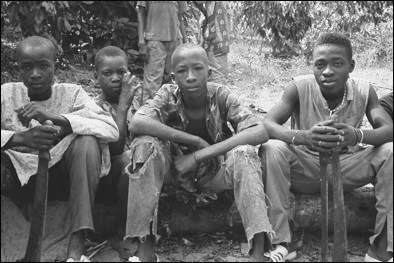 Robin Romano, a photographer, extensively investigated slavery and child labor in the Ivory Coast. He took this photograph on one of the cocoa plantations. In a lecture at the Univirsity of Connecticut, he quoted one of these enslaved worker as saying, "Tell them when they are eating chocolate, they are eating my flesh."
|
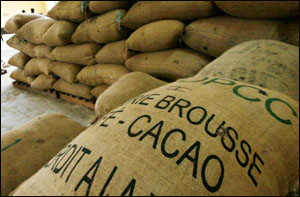 Americans are the leading world consumers of chocolate. We import 729,000 tons of cocoa beans costing $15 billion annually and consume about 4 billion pounds of chocolate every year. Most of the consumer chocolate comes from Hershey and Nestle (USA) as well as Cadbury (UK), who buy their cocoa products from suppliers like Archer Daniels Midland who, in turn, secure their raw cocoa from Africa's Ivory Coast.
Americans are the leading world consumers of chocolate. We import 729,000 tons of cocoa beans costing $15 billion annually and consume about 4 billion pounds of chocolate every year. Most of the consumer chocolate comes from Hershey and Nestle (USA) as well as Cadbury (UK), who buy their cocoa products from suppliers like Archer Daniels Midland who, in turn, secure their raw cocoa from Africa's Ivory Coast.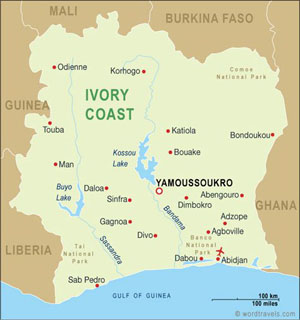 Most of the enslaved child workers come from neighboring Mali, which is one of the poorest countries in the world. Young people hoping for work are easy prey for child traffickers who sell the children as cheap labor to increase the profits of large plantations.
Most of the enslaved child workers come from neighboring Mali, which is one of the poorest countries in the world. Young people hoping for work are easy prey for child traffickers who sell the children as cheap labor to increase the profits of large plantations. 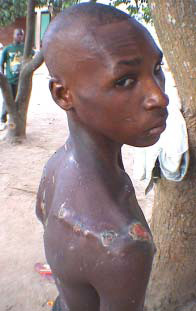 When night comes, Drissa [right] is again locked into a small room with 17 other teenage boys, with one tin can to share as the toilet. He, like his "roommates," have been tricked into a life of slavery. Stopped on the city streets of Korhogo, in West Africa's Ivory Coast, Drissa was offered what he thought was a good job working on a cocoa plantation. When he reached the isolated farm, however, he soon realized he was taken there as a slave. He tried to escape but was savagely beaten.
When night comes, Drissa [right] is again locked into a small room with 17 other teenage boys, with one tin can to share as the toilet. He, like his "roommates," have been tricked into a life of slavery. Stopped on the city streets of Korhogo, in West Africa's Ivory Coast, Drissa was offered what he thought was a good job working on a cocoa plantation. When he reached the isolated farm, however, he soon realized he was taken there as a slave. He tried to escape but was savagely beaten.